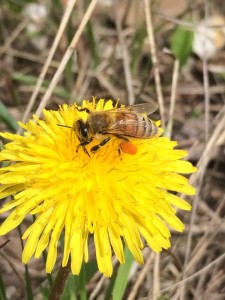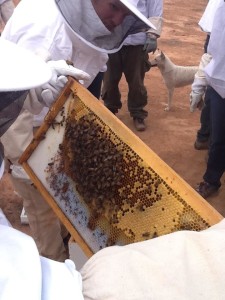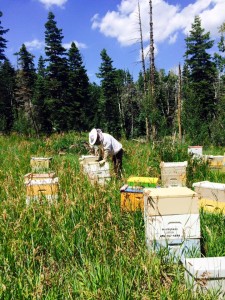
ST. GEORGE – A bill proposed in the Utah State Legislature would deregulate beekeeping in Utah and has beekeepers pondering how much regulation is good for bees, beekeepers and the beekeeping industry as a whole.
House Bill 115, the Beekeeping Modifications bill, would remove the requirement for beekeepers to register with the state and was introduced by Rep. Marc Roberts R-Santaquin. The bill would amend the existing Utah Bee Inspection Act of 1979.

“Beekeeping has been growing here in Utah and across the country, most people who get bees don’t realize they have to register and don’t know they are breaking a law,” Roberts said. Utah is the Beehive state, and Roberts doesn’t think registration should be required.
“Twenty two other states allow beekeeping without requiring any type of registration and they are doing just fine,” he said.
Besides making registration requirements voluntary rather than mandatory, H.B. 115 bars political subdivisions such as cities and counties from prohibiting a property owner from establishing or maintaining an apiary.
“My bill changes registration from mandatory to voluntary and removes the unlawful aspect of it which I think is a good thing” Roberts said. “We want to encourage more people to have bees, they are the main pollinators of our plants, flowers, and crops, and I think that’s what this bill does.”
Another proposal, the Beekeeping Amendments, has not yet been introduced to the House of Representatives, but would increase registration requirements and set new regulations for commercial beekeepers including specific rules about moving apiaries.
The amendments would also prevent a commercial beekeeping operation from operating withing a 2-mile radius of another commercial apiary. Violators of the new commercial regulations could be charged with a Class B misdemeanor.
Enforce the current law?
Washington County bee inspector Casey Lofthouse believes that no new regulation is needed.
“I think enforcing the current Bee Act would be far more conducive to success than to add or subtract any more restrictions … to change the Utah bee law just doesn’t make sense when we’re not enforcing it as currently written,” he said.

Counties in Utah are supposed to fund bee inspectors, but that funding often falls short, Lofthouse said. With more inspectors available, beehives would be healthier and beekeepers more successful.
In Utah, most inspections are already done on a voluntary basis because there are not enough bee inspectors, and the inspectors are not paid enough to justify mandatory inspections, Lofthouse said.
Rather than passing new legislation, it would be better to figure out how to employ bee inspectors in each county to address the lack of inspections, Lofthouse said. Having more bee inspectors on a permanent or seasonal basis would allow more frequent inspections, more education and more outreach to enforce the current beekeeping regulations.
As the bee inspector for Washington County, Lofthouse fields hundreds of phone calls each year from beekeepers asking questions, public safety agencies dealing with bee issues and pesticide applicators who want to know how to eradicate a problem hive without exposing other colonies to pesticides. Calls also come in from the general public, homeowners associations and municipalities.
Lofthouse is paid only about $1,000 per year for his duties as bee inspector, making it a tough choice when he needs to leave his regular job to attend to the demands for beekeeping help and expertise.
Should beekeepers have to register?
Currently, beekeepers are required to register with the Utah Department of Agriculture and Food. Registration with the state is a good idea, and a great value for beekeepers, Lofthouse said. The $10 annual fee is minimal and the benefits are many.
“That $10 that you pay to the state pays for an entomologist … it pays for information on the studies that they are doing,” he said. If beekeepers are registered, the Agriculture Department can contact them in the event of disease outbreaks or to simply offer new information or the latest scientific studies.

“People are making their living and if you as a hobbyist are allowing your bees to spread disease or get aggressive,” Lofthouse said, “then it’s bad for the industry, it’s bad for people who are following the rules.”
“I think it’s a balance between being restrictive and being responsible,” he said. “I don’t understand why somebody wouldn’t want to register as a beekeeper because it’s actually a resource for the beekeeper.”
The Agriculture Department has all kinds of resources to help people succeed at beekeeping, and the biggest benefit is information about beekeeping, diseases, the latest research, winter loss studies, and more.
“There’s a lot of stuff that the Department of Agriculture does to help get to the bottom of the difficulties of raising bees,” Lofthouse said. “They’re not the boogeyman out there to enforce all these rules on you, they’re going to work with the … beekeepers to make sure they’re successful.”
Resources
- Beekeeping class offered in Hurricane Feb. 26-27
- Utah State Legislature website
- Utah Department of Agriculture and Food – Beekeeping Web page
- The Art of Beekeeping in Utah – private Facebook group
Email: [email protected]
Twitter: @STGnews
Copyright St. George News, SaintGeorgeUtah.com LLC, 2016, all rights reserved.